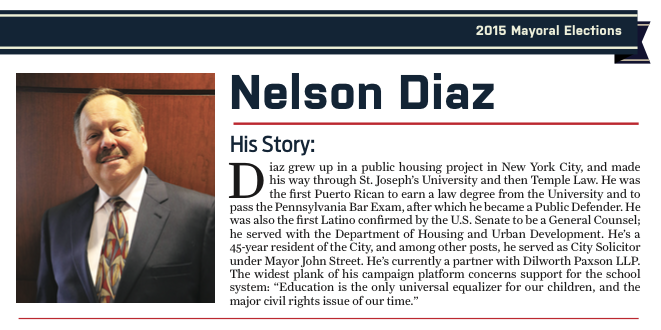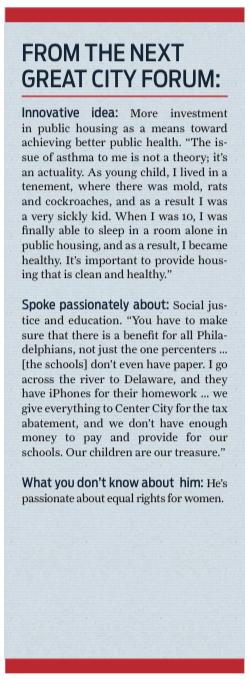 by Heather Shayne Blakeslee
by Heather Shayne Blakeslee
His Story:
Diaz grew up in a public housing project in New York City, and made his way through St. Joseph’s University and then Temple Law. He was the first Puerto Rican to earn a law degree from the University and to pass the Pennsylvania Bar Exam, after which he became a Public Defender. He was also the first Latino confirmed by the U.S. Senate to be a General Counsel; he served with the Department of Housing and Urban Development. He’s a 45-year resident of the City, and among other posts, he served as City Solicitor under Mayor John Street. He’s currently a partner with Dilworth Paxson LLP. The widest plank of his campaign platform concerns support for the school system: “Education is the only universal equalizer for our children, and the major civil rights issue of our time.”
 Vision for a sustainable Philadelphia
Vision for a sustainable Philadelphia
Making our city more pedestrian, bike, and mass-transit friendly would pay huge dividends immediately and over the long term. Prioritizing 21st century transit options would make the city more attractive to young families and seniors, and help reduce our carbon footprint. To accomplish that goal, I’ll work to extend the Broad Street Line to the Navy Yard, and create express service between Center City and Trenton, and then along the Northeast Corridor to provide regular commuter rail access to central New Jersey and New York City. I’ll fight to restore the mayor’s traditional control over major changes to the transportation network, work with PennDOT to improve state-owned roads, look for ways to add protected bike lanes or separated bus lanes where appropriate and where demand is high, and improve protection for pedestrians citywide.
In addition, I’ll take advantage of the assets we already have by prioritizing investments that connect neighborhoods to our existing network of bike and pedestrian trails. Creating these connections will be especially important as part of the rollout and long-term growth of the Philadelphia Bike Share Program, to ensure that transit alternatives are an option in every community, not just some of them.
Would you maintain or expand funding the Mayor’s Office of Sustainability?
We need a comprehensive citywide response to sustainability issues. In addition to supporting the full funding for the Mayor’s Office of Sustainability, I would make sure that we are taking advantage of all interagency opportunities, both entirely within local government and between local government and our state or federal government. By clearly making sustainability a top priority and looking for partnerships that don’t require local tax dollars, we’d make more efficient use of existing resources.
What’s your perspective on balancing public health and economic development?
This is not an either/or proposition. We need to make sure we’re aggressively mitigating any new air pollution from industrial development. At the same time, we have to reduce our reliance on automobiles and push denser economic development. That’s one reason I would partner with our universities to turn Philadelphia into a new economy hub; today we get less venture capital funding than any of our peer cities, which I’d work to change.
On climate change and resilience
We should be attacking the root causes of problems, rather than simply treating the symptoms. We need to be aggressively identifying where the gaps in our system are and start working to fill them in before they emerge as a crisis. I’m particularly influenced by the lesson of Superstorm Sandy in New York City. Identified vulnerabilities were not addressed ahead of time. Now, the city is racing against the clock to repair damage before crucial infrastructure, like the cross-Hudson rail tunnels, catastrophically fails. We need to be reviewing our emergency readiness and mitigating potential threats on an ongoing basis.
On equity and open space
I believe that the Land Bank creates the opportunity to fundamentally improve our communities and remove blight from our neighborhoods. Nobody wants to live—or locate a business—next to a burned-out house or abandoned, trash-strewn lot. I’d aggressively use the Land Bank in partnership with Philadelphia Public Housing Authority, PIDC, and community development corporations and neighborhood business groups to transform vacant or abandoned property into affordable housing or structured green space to spur community development. This would help replace the thousands of affordable units we’ve lost in recent years, and promote local solutions to food deserts in disadvantaged communities.



